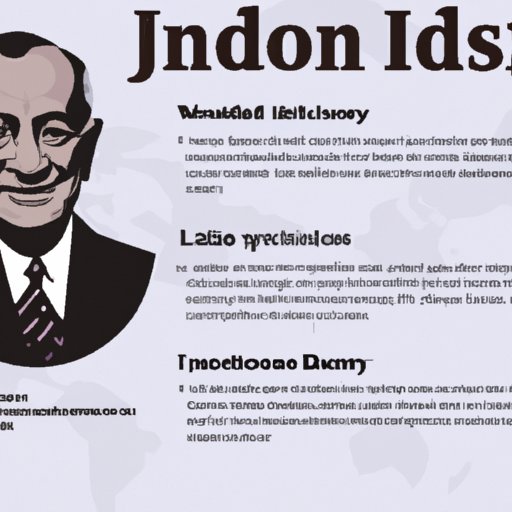Introduction
Lyndon B. Johnson is one of the most influential presidents in American history. He was a transformative leader who left an indelible mark on the nation’s political landscape. His leadership style was characterized by a strong sense of conviction, a commitment to reform, and a willingness to negotiate with his opponents. In this article, we will explore Johnson’s leadership style, looking at his role in American politics, his influence on the Civil Rights Movement, and his approach to decision making.
Analyzing Johnson’s Leadership Style in Historical Context
Johnson was a product of his times. He rose to power during a period of great social upheaval and political turmoil. As president, he was faced with the challenge of navigating a divided nation, balancing the demands of both liberals and conservatives. Johnson was a master politician, adept at using his power and influence to craft legislation and shape public opinion.
One of Johnson’s greatest accomplishments was his role in the passage of the Civil Rights Act of 1964, which outlawed segregation in the United States. Johnson worked tirelessly to build consensus among members of Congress, ultimately succeeding in passing one of the most important pieces of civil rights legislation in American history. Johnson also used his influence to push for other civil rights reforms, including the Voting Rights Act of 1965 and the Fair Housing Act of 1968.
In addition to his work on civil rights, Johnson was also known for his skillful handling of Congress. He was able to forge relationships with both Democrats and Republicans, allowing him to pass a wide range of legislation. Johnson was also known for his ability to navigate the complex world of Washington politics, often using his charm and wit to get things done.
Exploring Johnson’s Leadership Through His Political Legacy
Johnson’s presidency was marked by a number of significant achievements. In terms of domestic policy, Johnson pushed for the passage of Medicare and Medicaid, as well as a number of other progressive initiatives. On the foreign policy front, Johnson oversaw the escalation of the Vietnam War, though he later sought to end it through peace negotiations.
Johnson also had a profound impact on American society. He championed the cause of civil rights, while also expanding the government’s involvement in social welfare programs. Johnson also believed in the power of education, pushing for the expansion of educational opportunities for all Americans.
Assessing Johnson’s Effective Use of Power and Influence
Throughout his presidency, Johnson was known for his effective use of power and influence. He was a master negotiator, often able to broker deals between opposing sides. Johnson was also skilled at persuasion, often using his charisma and charm to sway members of Congress. Finally, Johnson was willing to compromise, understanding that sometimes concessions were necessary in order to move forward.
Examining Johnson’s Approach to Decision Making
Johnson was a decisive leader who was not afraid to take risks. He believed in leading by example, often setting the tone for his staff and colleagues. Johnson was also committed to public service, believing that government had a responsibility to serve the people. Finally, Johnson was a staunch believer in the power of education, often advocating for increased funding for schools and universities.
Investigating Johnson’s Leadership Qualities and Characteristics
At the heart of Johnson’s leadership style was a vision of progress and reform. He was a visionary leader who understood the need for change and was willing to take risks in order to bring it about. Johnson was also known for his charismatic personality, often captivating audiences with his passionate speeches. Finally, Johnson was driven by a passion for justice and equality, pushing for civil rights reforms that would improve the lives of all Americans.
Evaluating Johnson’s Impact on the American Presidency
Johnson left a lasting legacy on the American presidency. His tenure in office saw a dramatic expansion of presidential power, with Johnson wielding his influence to pass a variety of reforms. Johnson’s legacy of reform can still be seen today, with many of his initiatives still having an impact on American politics. Johnson also had a lasting influence on the presidency, with future presidents looking to him as an example of how to effectively lead a nation.
Conclusion
Lyndon B. Johnson was a transformational leader who left an indelible mark on American politics. His leadership style was characterized by a strong sense of conviction, a commitment to reform, and a willingness to negotiate with his opponents. Johnson’s legacy can still be seen today, with his influence still having an impact on the American presidency. Johnson’s approach to decision making and his effective use of power and influence serve as an example for future presidents.
(Note: Is this article not meeting your expectations? Do you have knowledge or insights to share? Unlock new opportunities and expand your reach by joining our authors team. Click Registration to join us and share your expertise with our readers.)
